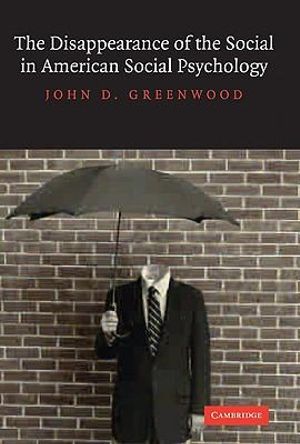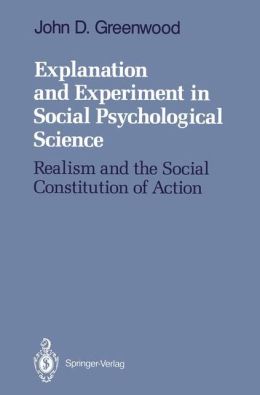Publications
Books:
2015: A Conceptual History of Psychology: Exploring the Tangled Web. Cambridge: Cambridge University Press.
As we have
2009: A Conceptual History of Psychology. New York: McGraw-Hill.
A Conceptual History of Psychology brings intellectual clarity to the fascinating and complex evolution of the discipline now known as psychology.
David Leary, University of Richmond
The best chapters on the development of behaviorism and neobehaviorism that I have ever read.
Marc Lindberg, Marshall University
The author has a clear writing style and an eclectic approach to some difficult material. I am going to enjoy using this book.
Robert Lana, Temple University.
The author does an amazing job of connecting ideas and people over time.
Victor Bissonette, Berry College
As a historian, the author has definitely done his homework and clarified the truth behind the myths in many areas.
Laura Schneider, Texas Wesleyan University
 2004: The Disappearance of the Social in American Social Psychology. New York: Cambridge University Press. Cambridge Studies in the History of Psychology.
2004: The Disappearance of the Social in American Social Psychology. New York: Cambridge University Press. Cambridge Studies in the History of Psychology.
John Greenwood’s The Disappearance of the Social in American Social Psychology offers a new and provocative history of a central subfield of the psychological sciences…The book’s conceptual historical approach provides the reader with a compelling and informative recapture of distinct ideas about the social and the individual that circulated through early twentieth century American psychology.
Isis
Greenwood’s book is unequalled in its sustained conceptual analysis of what was lost during the historical development of social psychology. It represents a profound theoretical contribution, sympathetic to empirical work, and offers an insightful commentary on the field’s current problems.
Kurt Danziger, Professor Emeritus of Psychology, York University, Toronto
This book by an outstanding scholar is a major contribution to understanding social psychology. The author spells out how early 20th century views of the ‘social’ were ignored or discarded, resulting in a contemporary social psychology that is too individualistic. He points the way to bringing the ‘social’ back in.
Paul F. Secord, Professor Emeritus of Psychology, University of Houston
1994: Realism, Identity and Emotion: Reclaiming Social Psychology. London: Sage.
This challenging book…by an unmistakably gifted author…is full of surprising, refreshing ideas…Greenwood shows that the attribution of social dimensions to psychological phenomena is no threat to the objectivity of scientific theories [of identity and emotion]. Whether one agrees with Greenwood’s ideas or not, his approach is thought-provoking.
De Psycholoog
1991: Relations and Representations: An Introduction to the Philosophy of Social Psychological Science. London: Routledge.
In this complex and challenging work, Greenwood critically examines the predominant empiricist paradigm in social psychological theory and what many see as its major alternative, so-called social constructivism, and, finding both seriously in error, presents a realist philosophy of science as an alternative to both…The book…presents a very different perspective on the science and subject-matter of social psychology from that
found in most mainstream and alternative texts…an excellent introduction to an important philosophical challenge to the accepted ways of conducting social psychology.
Choice

Greenwood’s impressive heir to Harré and Secord’s The Explanation of Social Behavior should become required reading for serious practitioners of the philosophy and science of social psychology…in the course of clarifying what constitutes the subject matter of social psychology, he has both given us powerful rejoinders to the social constructivist critique and deepened our understanding of basic problems in theory and research. Greenwood offers us a view of the crisis in social psychology that is a call to develop our science rather than despair of it.
Contemporary Psychology
Edited Collections:
1997: The Mark of the Social: Discovery or Invention? Lanham, MD: Rowman and
Littlefield.
1991: The Future of Folk Psychology: Intentionality and Cognitive Science. Cambridge:
Cambridge University Press.
1987: The Idea of Psychology. Singapore & Athens: Singapore & Ohio University Press.
1977: A Selective Bibliography of Philosophy of Science. With R. Harré, J. Hawthorn, and W.
Newton Smith. Oxford: Hannon.
Articles & Reviews:
2010: Bells, whistles and cogs in machines: Thomas Huxley and epiphenomenalism. Journal
for the History of the Behavioral Sciences, 46, 276-299.
2009: Materialism, strong continuity and early American psychology. Theory and Psychology,
19, 544-564.
2008: Mechanism, purpose and progress: Darwin and early American psychology. History of
the Human Sciences, 21, 103-126.
2007: Strange bedfellows. Review of Unfolding Social Constructionism by Fiona Hibberd.
Theory and Psychology, 17, 605-607.
2007: Unnatural epistemology. Mind and Language, 22, 132-149. .
2006: Did Kant say that? Review of The German Tradition of Psychology in Literature and
Thought, 1700-1840. Times Literary Supplement. December 22.
2004: What happened to the ‘social’ in social psychology? Journal for the Theory of Social Behaviour,
34, 19-34.
2003: Individualism and collectivism in moral and social thought. In K. C. Chong, S. Tan and C. L.
Ten (eds.), The Moral Circle and the Self: Chinese and Western Approaches. Chicago: Open
Court.
2003: Wundt, Völkerpsychologie, and experimental social psychology. History of Psychology, 6, 70-88.
2003: Social facts, social groups and social explanation. Nous, 37, 93-112
2002: Review of The Mechanization of the Mind by J. Dupuy. Journal for the History of the
Behavioral Sciences,39, 95-96.
2000: Individualism and the social in early American social psychology. Journal for the History
of the Behavioral Sciences, 36, 443-455.
1999: From Völkerpsychologie to cultural psychology: the once and future discipline?
Philosophical Psychology, 12, 503-514.
1999: Understanding the ‘cognitive revolution’ in psychology. Journal for the History of the
Behavioral Sciences, 35, 1-22.
1999: Simulation, theory-theory, and cognitive penetration: no ‘instance of the fingerpost’. Mind
& Language, 14, 32-56.
1998: Psychological ascription. Theory & Psychology, 8, 503-526.
1998: Mindspotting. Review of Theories of Theories of Mind, edited by P. Carruthers and P. K.
Smith (Cambridge University Press, 1996). Philosophical Books, 39, 117-118.
1997: Placebo control treatments and the evaluation of psychotherapy: A reply to Grünbaum
and Erwin. Philosophy of Science, 64, 497-510.
1997: Introduction: The mark of the social. In J. D. Greenwood (ed.), The Mark Of The
Social: Discovery of Invention? Lanham, MD: Rowman and Littlefield.
1996: Freud’s ‘tally’ argument, placebo control treatments, and the evaluation of psychotherapy.
Philosophy of Science, 63, 605-621.
1996: Multiples and memory. Review of Rewriting the Soul: Multiple Personality and the
Sciences of Memory, by Ian Hacking. International Studies in Philosophy.
1995: Models of human research subjects. In P. E. Shrout (ed.), Advances in Personality
Research, Methods and Theory. Hillsdale, N.J.: Laurence Erlbaum Associates. With P.F.
Secord
1994: Situated persons. Review of Persons and Situations, by R. Nisbett & L. Ross. Informal
Logic, 15, 231-236.
1994: A sense of identity: prolegomena to a social theory of personal identity. Journal for the
Theory of Social Behaviour, 24, 25-46.
1993: Split brains and singular personhood. Southern Journal of Philosophy, 31, 285-306.
1992: Against eliminative materialism: From folk psychology to Völkerpsychologie.
Philosophical Psychology, 5, 349-367.
1992: Self-knowledge: Looking in the wrong direction. Behavior and Philosophy, 12, 110-122.
1992: Man as rhetorician. Review of Arguing and Thinking, by M. Billig. Philosophical
Psychology, 5, 101-103.
1992: Discursive practices and psychological science. American Behavioral Scientist, 36, 115-
124.
1992: On the kinds of things that are emotions: reply to Scherer, Fischer, and Frija. New Ideas
in Psychology, 10, 29-33.
1992: The social constitution of emotion. New Ideas in Psychology, 10, 1-18.
1992: Realism, relativism, and rhetoric: reply to Harré, Parrot, Potter, and Shotter. Theory and
Psychology, 2, 183-192.
1992: Realism, empiricism, and social constructionism: psychological theory and the social
dimensions of mind and action. Theory and Psychology, 2,131-151.
1991: Reasons to believe. In J.D. Greenwood (ed.), The Future of Folk Psychology:
Intentionality and Cognitive Science. Cambridge: Cambridge University Press.
1991: Introduction: folk psychology and scientific psychology. In J.D. Greenwood
(ed.), op.cit.
1991: Naturalized epistemology and experimental psychology. New Ideas in Psychology, 9,
321-326.
1991: The mark of the social. Review of On Social Facts, by M. Gilbert. Social Epistemology,
5, 221-232.
1991: Action and its explanation. Proceedings of the Division of Consumer Psychology
(American Psychological Association), 15, 116-125.
1990: Two dogmas of neo-empiricism: The theory-informity of observations and the Quine-
Duhem thesis. Philosophy of Science, 57, 553-574.
1990: Self-knowledge: Inference, perception and articulation. Theoretical and Philosophical
Psychology, 10, 39-48.
1990: The social constitution of action: Objectivity and explanation. Philosophy of the Social
Sciences, 20, 194-204.
1990: Kant’s third antinomy: Agency and causal explanation. International Philosophical
Quarterly, 30, 43-57.
1989: Analycity, indeterminacy and semantic theory. Philosophical Studies, 57, 301-310.
1988: The social psychology of therapy evaluation: Control treatments and the ‘natural
negotiation’ hypothesis. Journal for the Theory of Social Behaviour, 18, 373-389.
1988: Agency, causality and meaning. Journal for the Theory of Social Behaviour, 18, 95-115.
Awarded JTSB Theory Prize for 1988.
1987: A realist theory of psychology. In J. D. Greenwood (ed.), The Idea of Psychology.
Singapore & Athens: Singapore and Ohio University Press.
1987: Introduction: philosophies and psychologies. In J. D.Greenwood (ed.), op.cit.
1987: Emotion and error. Philosophy of the Social Sciences, 17, 487-499.
1987: Scientific psychology and hermeneutical psychology: Causal explanation and the
meaning of human action. Human Studies, 10, 179-204.
1983: Role playing as an experimental strategy in social psychology. European Journal of
Social Psychology, 13, 235-254.
1982: On the relation between laboratory experiments and social behaviour: Causal
explanation and generalization. Journal for the Theory of Social Behaviour, 12, 225-250.



